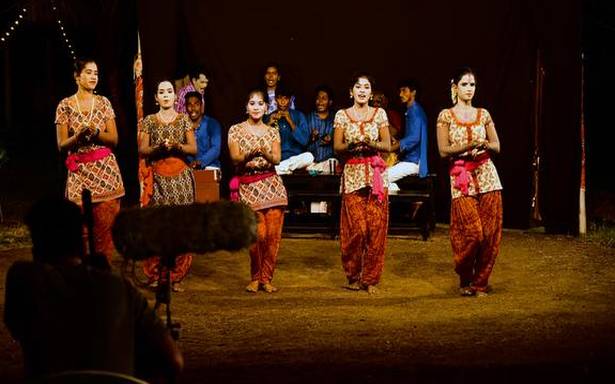Kattaikkuttu Sangam’s new play, Tavam, breaks new ground with an all-woman cast
Tamilarasi holds her infant with one hand as she swiftly applies make up with the other. She is getting ready for a Kattaikkoothu performance and is transforming into a menacing Dushasana. S. Tamilarasi, K. Venda, R. Mahalakshmi, A. Bharathi and S. Srimathy have embarked on a dream project — they are part of an all-woman Kattaikkoothu show that hopes to break the social taboos associated with women performing Koothu.
As one enters the Kuttu Kalai Koodam in Kanchipuram, a striking vintage portrait from the 1930s greets visitors. It shows a group of Koothu artistes posing for the camera, just before or after a show. The man in the centre is Ponnusami, who is draped in a sari for a female role. In those days, Kattaikoothu was strictly an all-male affair, deemed too physically demanding and socially demeaning for women. In this taxing theatre form, which is widespread in the northern and central parts of rural Tamil Nadu, the actors are required to put on elaborate makeup and costumes, sing, dance and speak dialogues.
P. Rajagopal, Ponnusami’s son, and Hanne M. de Bruin, the co-founders of Kattaikkuttu Sangam, have, over the past two decades, tried to break these taboos. One of their interventions has been to facilitate the entry of women into Koothu. Many women have shone brightly in the field, but it has not been easy. Social pressure as well as the responsibilities imposed after marriage and childbirth have forced many of them to discontinue the art form that they painstakingly mastered through years of rigorous training.
This phenomenon, however, is hardly unique to Koothu. As Rajagopal says, “Women from diverse fields face such barriers in their professional journey. Art is no different. In fact, there are some families in the villages who encourage women to continue the art.”
Srimathy as Duryodhana and P. Moorthy as the Kattiyakkaran | Photo Credit: Kattaikkuttu Sangam/PeeVee
To allow such women to focus on art and get time away from household chores, a residency programme was started by Hanne and drama therapist Maitri Gopalakrishna, titled the Kattaikkuttu Women’s Dream Project. The women bring in their young children and childcare facilities are provided. As part of the project, a production titled Tavam was conceptualised, which premiered at the Sangam last week. The experimental play, written by Rajagopal, has been created with inputs from the women performers about their lives and struggles. With contributions from Hanne and Maitri on the script, Tavam is a social commentary interspersed with traditional Koothu passages that seeks to highlight the constraints that prevent women from continuing their Koothu careers.
Rajagopal rushes backstage to inspect the arrangements as an exciting scene unfolds. The thundering beats of the mridangam are punctuated by the clang of cymbals. The mukhaveena and harmonium blend in with the percussion, generating a sense of high anticipation, as Draupadi (played by Venda) rushes out from behind the screen with Dushasana (Tamilarasi) in hot pursuit. ‘Nadadi jegakalli’ sings Dushasana as he drags Draupadi by her hair to the Kaurava court. The two performers hop, skip and twirl as they enact the scene and sing their parts, exhibiting immense stamina and breath control.
Tale with a twist
Tavam has been structured to incorporate a back story, where an old woman is taken by her young neighbour to watch a strange new Koothu where all the performers are women — this allows the script to add a commentary and contextualise the performance. In the Koothu, the women actors rebel against family members who try telling them to quit and take care of their homes or opt for more ‘acceptable’ occupations. The play ends with a twist — the actors convince their families to let them pursue the art, only to find that Koothu performances have been cancelled due to the lockdown.
Venda wears her anklets | Photo Credit: Vaishna Roy
The versatility of this unique theatre form is leveraged by using a section from the Kattaikkoothu play, Draupadi Kuravanji, to ask the community to practise self-restraint as the virus forces everyone to stay safe and indoors. Verses from the Thevaram have also been sprinkled in to show how women’s foray into the arts is no less than penance — tavam — as they challenge hurdles and create history.
While many art forms have transitioned online in the wake of the pandemic, it has been particularly challenging for Kattaikkoothu to do the same. Performances are usually presented in open community spaces, with a live audience integral to the form. Every year, March to September is the high season for Kattaikkoothu, but the last two years have brought performances to a standstill. Digital networks in rural areas are not good either, which has exacerbated the problem. Many full-time Koothu artistes have been unemployed or have turned to other work to make ends meet.
In parallel, Tavam has been made into a film by the Sangam in collaboration with Bengaluru-based director Sandhya Kumar. Besides hoping to stage the play at other venues or during the December Season in Chennai, the Sangam will also release the film online. The troupe is using crowdfunding to raise funds for the project and to pay the performers.
The pandemic has had another tragic fallout — Kattaikkuttu Sangam’s acclaimed Kattaikkuttu Gurukulam, which functioned for 18 years, was shut down in early 2020 due to a funds shortage. The school provided holistic education in academics and Koothu for children from disadvantaged backgrounds. Now, an indigenous Kattaikkuttu Knowledge Centre is being planned as part of outreach efforts and to facilitate the sharing of artistic traditions, skills and knowledge with theatre practitioners from various backgrounds.
Tamilarasi puts on her Dushasana face | Photo Credit: Vaishna Roy
The writer is a rasika of classical music and dance and also plays the veena.
Source: Read Full Article


